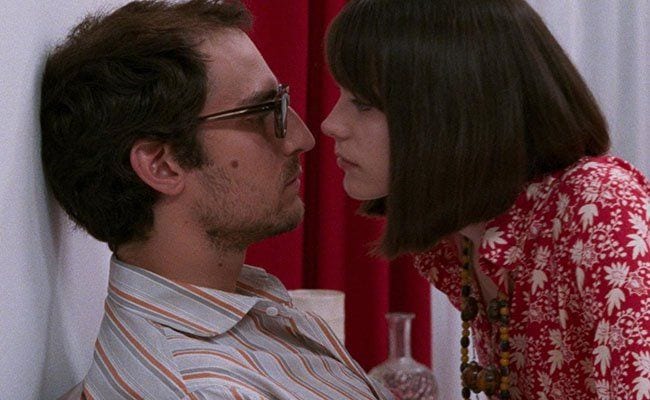
The first press screening for Redoubtable (Le Redoutable) Cannes 2017 was almost canceled because of a suspicious package. While we were waiting to enter the theater, some joked that it must have been Jean-Luc Godard who organized the bomb threat. Godard most likely could not care less, however: he has been ignoring Cannes and Oscars invitations for years.
Later we’d learn that critics at Cannes booed at every screening of Redoubtable, apparently shocked by the way Michel Hazanavicius, a mainstream director, makes light comedy of the living legend of the French New Wave. More disturbingly, the film misrepresents the place of radicalism in the history of avant-garde cinema.
“Wolfgang Amadeus” Godard (Louis Garrel), as he is introduced in the opening credits, is a self-centered, insecure, and mumbling character. Already recognized as a genius in 1967, when the film begins, within the next few years he manages to alienate friends and fans with his imperious and uncompromising Maoist opinions. Garrel mimics Godard’s mannerisms well, but the script conveys neither his political convictions nor creative process.
The film unfolds entirely from the point of view of his ex-wife, actress and writer Anne Wiazemsky, based on her memoir Un An après (1968). The story begins early in their affair, as they shoot La Chinoise (1967) together. Their relationship unravels as Godard loses confidence in his art and succumbs to jealousy. Stacy Martin looks nothing like Anne Wiazemsky, but rather, her poised look echoes Godard’s other muse, Anna Karina. Anne is a likeable but passive companion, first erotic and pensive, then bored and depressed, and never to blame for anything.
The best part of Redoubtable is its homage to Godard’s style, in the way that Hazanavicius’s earlier Artist (2011) is a tribute to silent cinema. Redoubtable reproduces elements of Godard films — lingering closeups, extended philosophical dialogues, several simultaneous linguistic tracks (spoken words and internal thoughts, or conversations and street graffiti). Fans of Godard’s cinema will enjoy deciphering references to his films Vivre sa vie (1962) and Le Mépris (1963).

Still, Redoubtable fails unforgivably as a statement about the art and politics of the radical ’60s. Sure, “Wolfgang Amadeus” Godard marches in demonstrations and lectures to student protesters in Paris in 1968. (They boo him out of the hall.) But his radicalism puts him at a creative impasse. His call for the Cannes Film Festival to cancel its 1968 edition in solidarity with Paris protests is a juvenile mistake. Godard has only two options: either he makes bad films by committee in the radical Dziga Vertov group, a collective he founded in 1968 together with Jean-Pierre Gorin, or he reasserts creative control and goes back to crowd-pleasing aesthetics of his 1960 film, Breathless.
In fact, radical collective projects of the late ’60s represented a crucial stage for the avant-garde cinema of that era; see, for example, Chris Marker’s Medvedkin Group, also founded in 1968. Godard’s and Marker’s subsequent work drew upon this collective experience and could not have been made without it. Film festival protests of 1968 led major festivals — Cannes, Berlin, Venice — to create special sections focusing on young, experimental, and non-Western cinema. Festivalgoers can enjoy the Directors’ Fortnight program at Cannes, thanks to that era. As a cinephile, Hazanavicius should have known this.
We are wholly independent, with no corporate backers.
Simply whitelisting PopMatters is a show of support.
Thank you.

Dustin Hoffman and Noah Baumbach in The Meyerowitz Stories (2017)
Noah Baumbach’s comedy film, The Meyerowitz Stories also evolves around a cantankerous man, with much lower stakes but more fun.
Three neurotic adult children converge on their father Harold’s (Dustin Hoffman) Greenwich Village apartment just as his health is failing after a fall. Harold is a former Bard professor and a sculptor whose only claim to fame is one work purchased by the Whitney Museum in his youth.
Hoffman excels as Harold the insufferable crank. Harold pesters his children for not being artists yet only talks about his own work and the recognition it should have gotten. He walks out “in protest” of every public event he attends, including his old friend L.J. Shapiro’s (Judd Hirsch) solo show at the Museum of Modern Art. His legacy show is only a group show of faculty at Bard.
The neuroses with his kids dates back to the way Harold treated them when they were still little. He abandoned his children from his first marriage, Danny (Adam Sandler), a failed pianist, and Jean (Elizabeth Marvel). He lords his other son’s success over them — Matthew (Ben Stiller) is a financing consultant for celebrities — but belittles him to his face. The sons’ rivalries come out during the Bard opening. Both deliver speeches bloodied after their fight.
Women temper men’s hysterical outbursts. Inebriated Maureen (Emma Thompson) maintains her laid-back hippie demeanor as she serves inedible meals to increasingly agitated in-laws. Danny’s daughter Eliza (Grace Van Patten), a Bard student and an author of risqué feminist videos, is wonderfully oblivious of his lack of success. And Jean narrates her painful indignities of childhood with calm fatalism.
Fans of 2005’s The Squid and the Whale will find all of Baumbach’s typical elements here: irritable people, painful family relationships, ridiculous situations, and fast-paced dialogues. Howard Meyerowitz is definitely not a genius. Baumbach’s understanding of the New York City intellectual scene, however, certainly exceeds Hazanavicius’ grasp on film history.


![Call for Papers: All Things Reconsidered [MUSIC] May-August 2024](https://www.popmatters.com/wp-content/uploads/2024/04/all-things-reconsidered-call-music-may-2024-720x380.jpg)



